Dreaming of running your own agency? There are a lot of possibilities out there, from travel to advertising and marketing, to recruiting, SEOconsult ...
You might consider targeting a niche, such as digital billboards.
We earn commissions if you shop through the links below. Read more
Written by: Carolyn Young
Carolyn Young is a business writer who focuses on entrepreneurial concepts and the business formation. She has over 25 years of experience in business roles, and has authored several entrepreneurship textbooks.
Edited by: David Lepeska
David has been writing and learning about business, finance and globalization for a quarter-century, starting with a small New York consulting firm in the 1990s.
Published on May 9, 2023
Updated on July 3, 2024
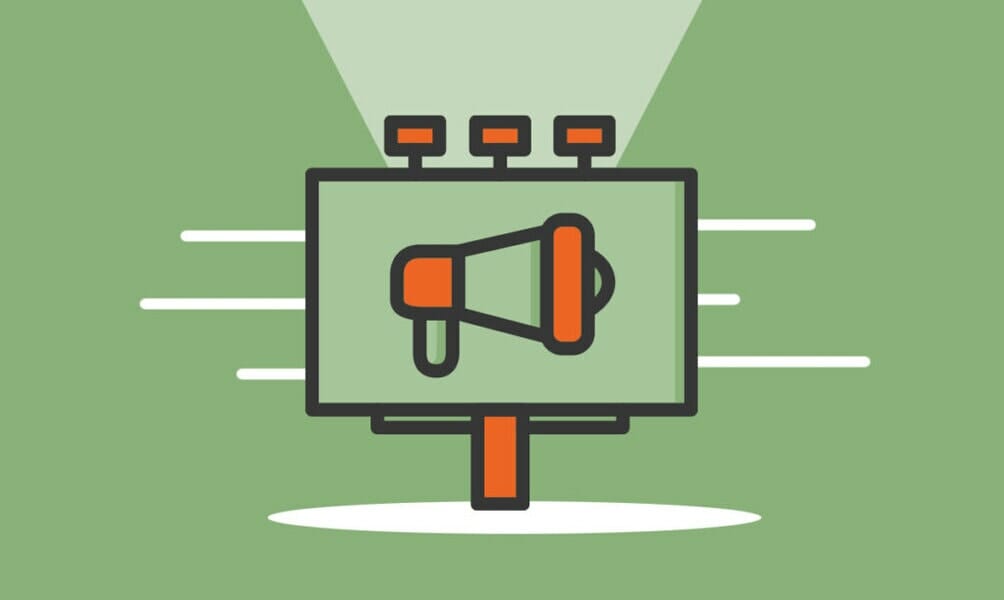
Investment range
$81,300 - $113,300
Revenue potential
$36,000 - $216,000 p.a.
Time to build
6-12 months
Profit potential
$18,000 - $108,000 p.a.
Industry trend
Declining
Commitment
Flexible
Have you ever driven by a billboard and wondered how it got there, who owns it, and who’s profiting? Well, probably not, but billboard advertising is a $9 billion industry, and an interesting one.
Billboard advertising companies usually lease a small plot of land from a landowner, build the billboard, and pay the landowner a percentage of the revenue that comes from selling the ad space on the billboard. The landowner gets a fully passive income from their land, and the billboard advertising company also gets a relatively passive income from the advertiser.
Sounds like a good deal, right? You could get in on the action by starting your own billboard advertising company.
But before you go hunting for land, you’ll need to understand more about the business. Luckily, this step-by-step guide has you covered with all the information you need to start a successful billboard advertising business.
Looking to register your business? A limited liability company (LLC) is the best legal structure for new businesses because it is fast and simple.
Form your business immediately using ZenBusiness LLC formation service or hire one of the Best LLC Services.

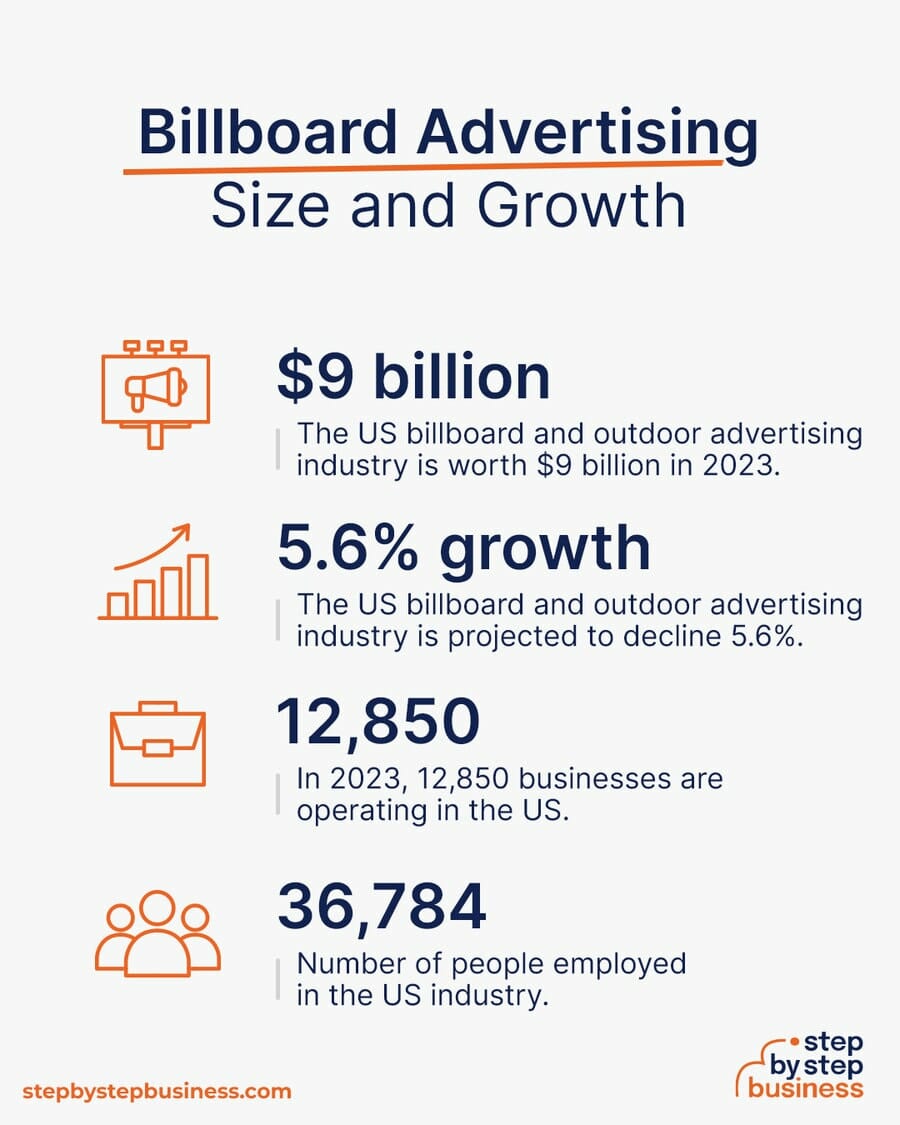
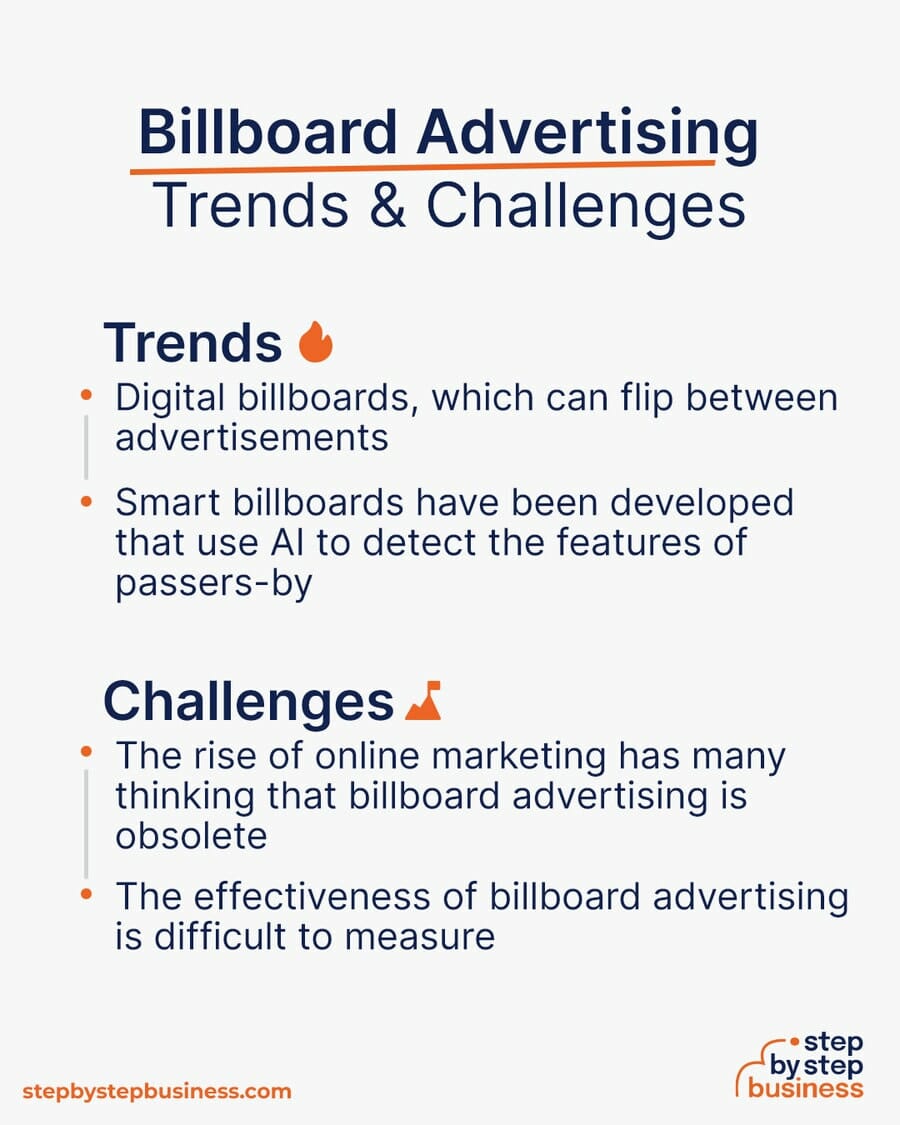
Trends
Challenges
Startup costs for a billboard advertising business range from $80,000 to $115,000. Costs include your initial lease payment and the construction of the billboard.
Instead of leasing the land, you could purchase an easement on the landowner’s property from the landowner. This increases your upfront costs, but you’ll have a higher profit margin going forward since you won’t be making lease payments.
| Start-up Costs | Ballpark Range | Average |
|---|---|---|
| Setting up a business name and corporation | $100 - $500 | $300 |
| Business licenses and permits | $100 - $300 | $200 |
| Insurance | $100-$500 | $300 |
| Website | $500 - $1,000 | $750 |
| Initial lease payment to landowner | $5,000 - $10,000 | $7,500 |
| Billboard construction | $75,000 - $100,000 | $87,500 |
| Sales and marketing budget | $500 - $1,000 | $750 |
| Total | $81,300 - $113,300 | $97,300 |
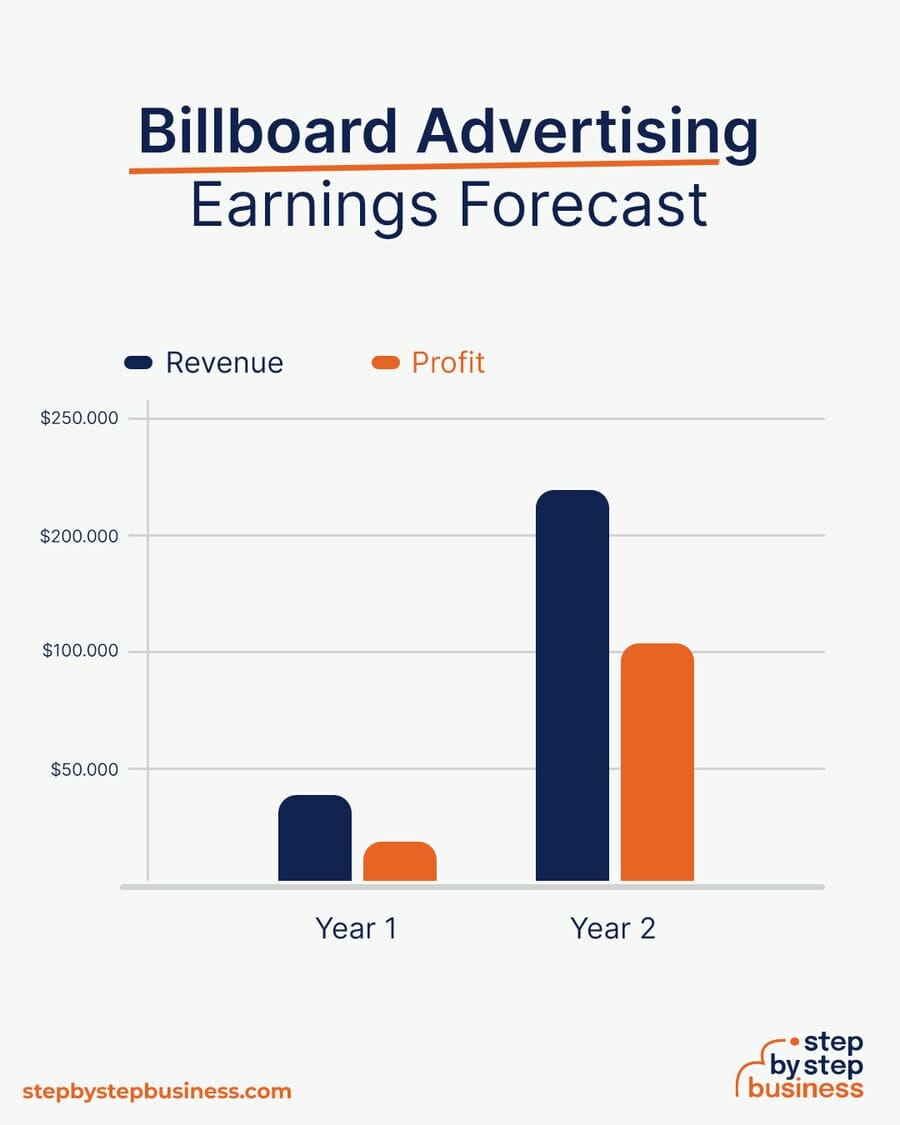
How much you charge for billboard advertising space will depend on the location. In a rural area you can expect about $1,500 per month, while for billboards in a mid-sized city can fetch $3,000 per month. In both these areas, you can expect to pay the landowner about 20% of what you bring in. Your overall profit margin after all expenses should be about 50%.
These calculations will assume that you’ll start with one billboard that brings in $3,000 per month, which would mean $36,000 in revenue and $18,000 in profit.
As you gain traction, you might add five new billboards to your portfolio for a total of six. With annual revenue of $216,000, you’d make a tidy profit of $108,000.
There are a few barriers to entry for a billboard advertising business. Your biggest challenges will be:

Now that you know what’s involved in starting a billboard advertising, it’s a good idea to hone your concept in preparation to enter a competitive market.
Market research could give you the upper hand even if you’ve got the perfect product. Conducting robust market research is crucial, as it will help you better understand your customers, your competitors, and the broader business landscape.
Research billboard advertising businesses in your area to examine their services, price points, and customer reviews.
This should identify areas where you can strengthen your business and gain a competitive edge to make better business decisions.
You’re looking for a market gap to fill. For instance, maybe the local market is missing a billboard advertising company that offers other types of ooh advertising such as bench or bus advertising. (ooh advertising is out of home advertising).
You might consider targeting a niche, such as digital billboards.
This could jumpstart your word-of-mouth marketing and attract clients right away.
In addition to billboard ads, you could offer bench ads or bus stop ads. Those would require less of an upfront investment.
Prices will be based on market prices in your chosen location. They should also be based on your costs to produce the ads.
Once you know your costs, use this Step By Step profit margin calculator to determine your mark-up and final price points. Remember, the prices you use at launch should be subject to change if warranted by the market.
Your target market will be business owners in your chosen location. You can connect with them on LinkedIn or call on them directly.
In the early stages, you may want to run your business from home to keep costs low. But as your business grows, you’ll likely need to hire workers for various roles and may need to rent out an office. You can find commercial space to rent in your area on sites such as Craigslist, Crexi, and Instant Offices.
When choosing a commercial space, you may want to follow these rules of thumb:
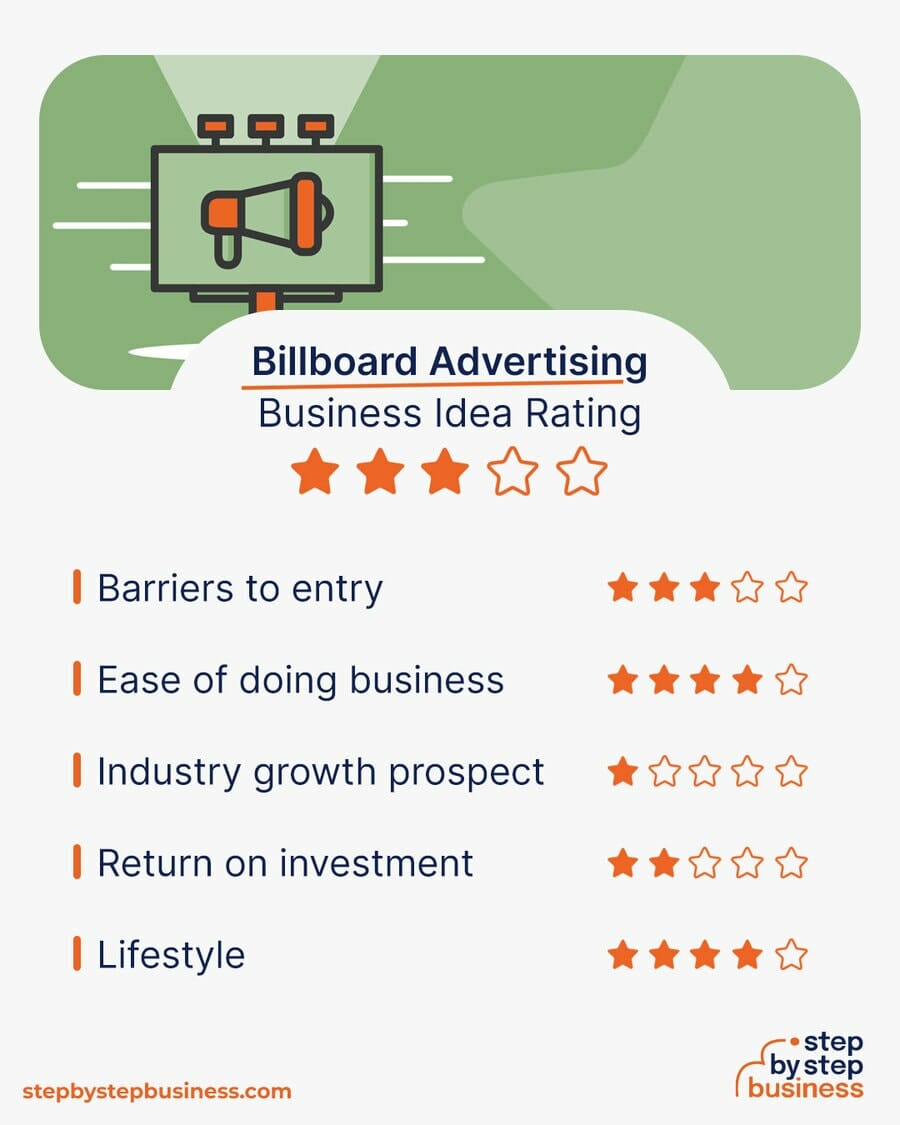

Here are some ideas for brainstorming your business name:
Once you’ve got a list of potential names, visit the website of the US Patent and Trademark Office to make sure they are available for registration and check the availability of related domain names using our Domain Name Search tool. Using “.com” or “.org” sharply increases credibility, so it’s best to focus on these.
Finally, make your choice among the names that pass this screening and go ahead and reserve your business name with your state, start the trademark registration process, and complete your domain registration and social media account creation.
Your business name is one of the key differentiators that sets your business apart. Once you pick a name, reserve it and start with the branding, it’s hard to switch to a new name. So be sure to carefully consider your choice before moving forward.
Here are the key components of a business plan:

If you’ve never created a business plan, it can be an intimidating task. You might consider hiring a business plan specialist to create a top-notch business plan for you.
Registering your business is an absolutely crucial step — it’s the prerequisite to paying taxes, raising capital, opening a bank account, and other guideposts on the road to getting a business up and running.
Plus, registration is exciting because it makes the entire process official. Once it’s complete, you’ll have your own business!
Your business location is important because it can affect taxes, legal requirements, and revenue. Most people will register their business in the state where they live, but if you are planning to expand, you might consider looking elsewhere, as some states could offer real advantages when it comes to billboard advertising businesses.
If you’re willing to move, you could really maximize your business! Keep in mind, it’s relatively easy to transfer your business to another state.
Business entities come in several varieties, each with its pros and cons. The legal structure you choose for your billboard advertising business will shape your taxes, personal liability, and business registration requirements, so choose wisely.
Here are the main options:

We recommend that new business owners choose LLC as it offers liability protection and pass-through taxation while being simpler to form than a corporation. You can form an LLC in as little as five minutes using an online LLC formation service. They will check that your business name is available before filing, submit your articles of organization, and answer any questions you might have.
Choose Your State
The final step before you’re able to pay taxes is getting an Employer Identification Number, or EIN. You can file for your EIN online or by mail or fax: visit the IRS website to learn more. Keep in mind, if you’ve chosen to be a sole proprietorship you can simply use your social security number as your EIN.
Once you have your EIN, you’ll need to choose your tax year. Financially speaking, your business will operate in a calendar year (January–December) or a fiscal year, a 12-month period that can start in any month. This will determine your tax cycle, while your business structure will determine which taxes you’ll pay.
The IRS website also offers a tax-payers checklist, and taxes can be filed online.
It is important to consult an accountant or other professional to help you with your taxes to ensure you are completing them correctly.
Securing financing is your next step and there are plenty of ways to raise capital:

Bank and SBA loans are probably the best option, other than friends and family, for funding a billboard advertising business. You might also try crowdfunding if you have an innovative concept.

Starting a billboard advertising business requires obtaining a number of licenses and permits from local, state, and federal governments.
You’ll have to comply with all federal and state regulations regarding highways.
Federal regulations, licenses, and permits associated with starting your business include doing business as (DBA), health licenses and permits from the Occupational Safety and Health Administration (OSHA), trademarks, copyrights, patents, and other intellectual properties, as well as industry-specific licenses and permits.
You may also need state-level and local county or city-based licenses and permits. The license requirements and how to obtain them vary, so check the websites of your state, city, and county governments or contact the appropriate person to learn more.
You could also check this SBA guide for your state’s requirements, but we recommend using MyCorporation’s Business License Compliance Package. They will research the exact forms you need for your business and state and provide them to ensure you’re fully compliant.
This is not a step to be taken lightly, as failing to comply with legal requirements can result in hefty penalties.
If you feel overwhelmed by this step or don’t know how to begin, it might be a good idea to hire a professional to help you check all the legal boxes.
Before you start making money, you’ll need a place to keep it, and that requires opening a bank account.
Keeping your business finances separate from your personal account makes it easy to file taxes and track your company’s income, so it’s worth doing even if you’re running your billboard advertising business as a sole proprietorship. Opening a business bank account is quite simple, and similar to opening a personal one. Most major banks offer accounts tailored for businesses — just inquire at your preferred bank to learn about their rates and features.
Banks vary in terms of offerings, so it’s a good idea to examine your options and select the best plan for you. Once you choose your bank, bring in your EIN (or Social Security Number if you decide on a sole proprietorship), articles of incorporation, and other legal documents and open your new account.
Business insurance is an area that often gets overlooked yet it can be vital to your success as an entrepreneur. Insurance protects you from unexpected events that can have a devastating impact on your business.
Here are some types of insurance to consider:


As opening day nears, prepare for launch by reviewing and improving some key elements of your business.
Being an entrepreneur often means wearing many hats, from marketing to sales to accounting, which can be overwhelming. Fortunately, many websites and digital tools are available to help simplify many business tasks.
You may want to use industry-specific software, such as SignDash, or Ad Sales Genius, to manage your contracts, billboard space inventory, and invoicing.
Website development is crucial because your site is your online presence and needs to convince prospective clients of your expertise and professionalism. You can create your own website using services like WordPress, Wix, or Squarespace. This route is very affordable, but figuring out how to build a website can be time-consuming. If you lack tech-savvy, you can hire a web designer or developer to create a custom website for your business.
Your customers are unlikely to find your website, however, unless you follow Search Engine Optimization (SEO) practices. SEO will help your website appear closer to the top in relevant search results, a crucial element for increasing sales.
Make sure that you optimize calls to action on your website. Experiment with text, color, size, and position of calls to action such as “Buy Ad Space Now”. This can sharply increase purchases.
Here are some powerful marketing strategies for your future business:

Unique selling propositions, or USPs, are the characteristics of a product or service that sets it apart from the competition. Customers today are inundated with buying options, so you’ll have a real advantage if they are able to quickly grasp how your billboard advertising business meets their needs or wishes. It’s wise to do all you can to ensure your USPs stand out on your website and in your marketing and promotional materials, stimulating buyer desire.
Global pizza chain Domino’s is renowned for its USP: “Hot pizza in 30 minutes or less, guaranteed.” Signature USPs for your billboard advertising business could be:
You may not like to network or use personal connections for business gain. But your personal and professional networks likely offer considerable untapped business potential. Maybe that Facebook friend you met in college is now running a billboard advertising business, or a LinkedIn contact of yours is connected to dozens of potential clients. Maybe your cousin or neighbor has been working in billboard advertising for years and can offer invaluable insight and industry connections.
The possibilities are endless, so it’s a good idea to review your personal and professional networks and reach out to those with possible links to or interest in billboard advertising. You’ll probably generate new customers or find companies with which you could establish a partnership.

If you’re starting out small from a home office, you may not need any employees. But as your business grows, you will likely need workers to fill various roles. Potential positions for a billboard advertising business include:
At some point, you may need to hire all of these positions or simply a few, depending on the size and needs of your business. You might also hire multiple workers for a single role or a single worker for multiple roles, again depending on need.
Free-of-charge methods to recruit employees include posting ads on popular platforms such as LinkedIn, Facebook, or Jobs.com. You might also consider a premium recruitment option, such as advertising on Indeed, Glassdoor, or ZipRecruiter. Further, if you have the resources, you could consider hiring a recruitment agency to help you find talent.

Billboard advertising is not dead! It’s still an effective way for businesses to get brand exposure and a $9 billion industry. You could start your billboard advertising business on a small scale, and eventually have billboards all across the country. The potential is huge.
Now that you understand the business, you’re ready to find your prime location and get your billboard advertising business going!
Yes, a billboard advertising business can be profitable. The profitability of the business largely depends on factors such as the location of the billboards, the number of advertisers, and the demand for outdoor advertising in the area. High-traffic locations with a strong demand for advertising can generate substantial revenue for the business.
The growth potential of a billboard advertising business can be significant. As long as there is a demand for outdoor advertising, the business can expand by adding more billboards in strategic locations. Additionally, advancements in technology, such as digital billboards, offer new opportunities for revenue growth and increased flexibility in delivering targeted advertising content.
A billboard advertising business falls under the category of outdoor advertising or out-of-home (OOH) advertising. It involves owning, operating, and managing billboards or other outdoor advertising structures to provide a platform for advertisers to showcase their products, services, or messages to a wide audience.
Starting a billboard advertising business on the side is possible, but it can be challenging due to the investment required and the need for ongoing management and maintenance. Successful billboard advertising businesses typically require a significant initial investment in acquiring or leasing billboard locations, constructing or purchasing the billboards themselves, and marketing the advertising space to potential advertisers.
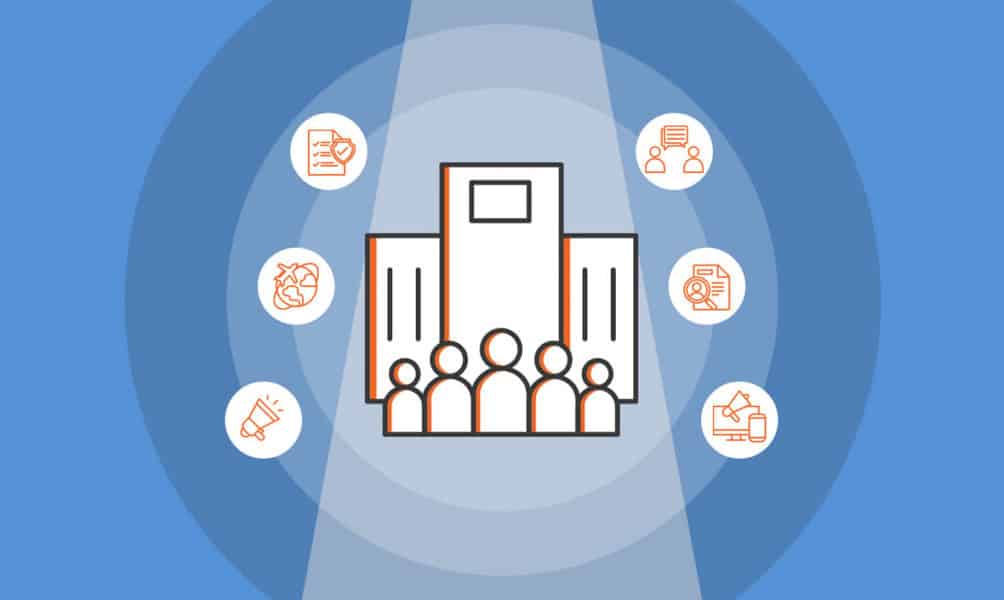
Published on August 11, 2022
Dreaming of running your own agency? There are a lot of possibilities out there, from travel to advertising and marketing, to recruiting, SEOconsult ...
Read Now
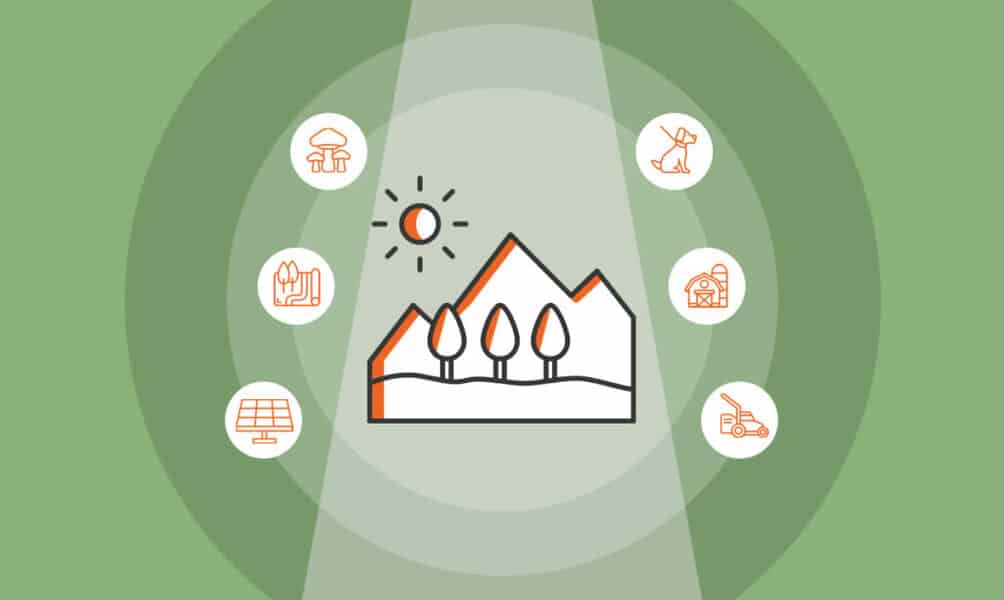
Published on July 13, 2022
Many major American businesses depend on outdoor activities, such as The North Face or Columbia. But there are also countless smaller businessesthat ...
Read Now

Published on June 30, 2022
Want to express your creativity and be your own boss? There are many creative business ideas out there that can help you check both boxes, and makeg ...
Read Now
No thanks, I don't want to stay up to date on industry trends and news.
Comments